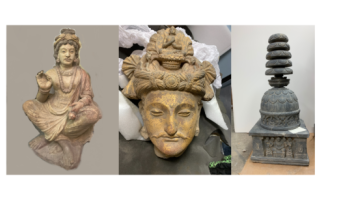The U.S. Treasury Department’s Financial Crimes Enforcement Network (FinCEN) issued a so-called Blue Box Notice on Tuesday to inform art and antiquities traders that they will be held to the same reporting standards as financial institutions are under the 1970 Bank Secrecy Act (BSA).
This means that they will have to submit suspicious activity reports (SARs) for antiquities trade.
The new rules come just months after a congressional bill gave the Treasury Department a year to come up with regulations to help mitigate the threat of money laundering, crime and terror financing in the antiquities trade.
“Financial institutions with existing BSA obligations, including the reporting of suspicious activity, should be aware that illicit activity associated with the trade in antiquities and art may involve their institutions,” The Blue Box Notice read.
It also said that crimes relating to antiquities and art may include looting or theft, the illicit excavation of archaeological items, smuggling, and the sale of stolen or counterfeit objects as well as money laundering and sanctions violations.
Such crimes “have been linked to transnational criminal networks, international terrorism, and the persecution of individuals or groups on cultural grounds,” the document said.
Indeed, the trade, which according to a 2018 report by Standard Charter Bank is believed to be a multi-billion dollar industry has been found to be a frequent funding source for terrorism and organized crime.
“You cannot look at it separately from combating trafficking in drugs and weapons. We know that the same groups are engaged, because it generates big money,” said Catherine de Bolle, Executive Director of Europol after a major crackdown on the illegal antiquities trade back in May.
The looting of cultural property from active war zones is also considered a war crime under the 1954 Hague Convention.
While art and antiquities traders in the U.S are becoming accustomed to the new regulations, in the U.K., art dealers have already found loopholes to circumvent regulations imposed in January, the Art Newspaper reported.
Shocking the U.K. art scene, the British government began requiring sellers to conduct due diligence checks on buyers. However, according to Art Newspaper, too often the art sellers have been relying on the word of the market’s middle-men, thereby maintaining the buyer’s anonymity, something long valued in the art world.
According to experts however, that’s not good enough.
“They tell you, ‘I have checked my client and they’re okay.’ They don’t reveal the collector’s name, and the deal proceeds,” Susan J. Mumford, co-founder of ArtAML told the Art Newspaper. “The problem is: that’s not how reliance works.”
According to guidelines by the British Art Market Federation, even when accepting due diligence from a third party, the identity of the final buyer still needs to be known.






